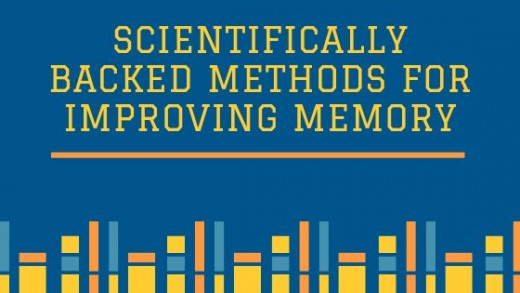Tried and Tested Ways of Improving Memory Retention

Scientifically Backed Methods for Improving Memory
There are few things as frustrating as spending endless hours hunched over your textbooks for exam preparation, only to find that you cannot recall a single piece of information the next day. A weak memory can significantly reduce the effectiveness of your exam preparation and study sessions. Not only that, but a weak memory will also negatively affect other areas of your daily life.
Luckily, there are scientifically-proven methods of improving your memory. These tips and tricks will enhance concentration, allow for better comprehension, and boost information recall and retention.
There is no “Quick Fix”
Many people believe that tricks to boost memory are nothing more than myths and scams. And to be fair, there is no “quick fix” for immediately boosting memory retention. Nor will these tips magically give you immaculate photographic memory. However, these tried and tested methods of improving information recall and memory retention are lifestyle changes that will enhance your brain function and hence sharpen memories.
These memory-boosting methods will therefore not only give you an edge during exam preparation, but it will also lead to healthier brain function and enhanced cognitive abilities.
How are Memories Formed?
Before we get into the methods for boosting memory, let us first understand how exactly memories are formed in the first place.
To begin with, memory can be simply defined as “the process of interpreting, processing, storing, and retrieving information in the mind”. The human brain is full of neurons, or nerve cells, which are responsible for processing information and formulating thoughts. When the brain processes new information, it forms new connections between these neurons, known as synapses. The stronger these connections are, the stronger memories will be formed.
However, this is not all. The brain experiences millions of pieces of information each day, most of which are processed as short term memories and retained in the brain for no more than 15 to 30 seconds. In order to store important information as long-term memories, which can be recalled later, there is a process known as memory consolidation.
Memory Consolidation
Memory consolidation is the process of converting information gathered throughout the day into long-term memories. This process usually occurs while we sleep, and in particular during REM (rapid eye movement) sleep cycles.
However, while memory consolidation will store memories, it does not mean that all memories will be recalled with the same strength. Memories will become stronger when there it is repeated and committed to memory over time. In other words, when the brain is exposed to the information several times, the connections, or synapses, between neurons will become stronger, leading to better memory recall. This is why constant revision is standard when learning a subject and during exam preparation for final exams.
Methods for Improving Memory
Now that we have understood that processing, storing, and retrieving memories is a complex process, we can better learn how to take actions in order to boost memories.
Adequate Sleep
The link between sleep and memory is evident. While your body sleeps, your brain is hard at work consolidating memories. Thus, in order to take the information that you have studied throughout the day and convert it into long-term memories, sleep is necessary.
This means that if you want to make the most effective use out of your time spent studying, do not forsake your sleep. Develop a study schedule that gives you plenty of time to undergo exam preparation throughout the day. This way, you will be able to sleep on time and your brain will get a chance to process the information you learn throughout the day.
For this reason, cramming at night will not be effective in retaining information, as your brain will not have a chance to consolidate the memories.
Brain-Boosting Diet
Believe it or not but your diet plays a considerable role in your ability to store and recall information. This is because a nutritious and healthy diet will improve blood circulation, which will strengthen the connections in your brain. There are certain brain foods which will also enhance brain function and cognitive abilities, hence allowing for better comprehension and memory formation.
Here are some top brain foods that you should include in your diet for improving memory:
-
Omega-3 fatty fish such as salmon, mackerel, and tuna
-
Nuts and seeds such as walnuts, cashews, almonds, flax seeds, and sunflower seeds
-
Fresh fruits and berries, especially antioxidant rich blueberries and strawberries
-
Leafy green vegetables such as spinach, kale, and collard greens
-
Water! Staying hydrated throughout the day will promote optimal brain function
Omega-3 is proven to be essential for brain health. It is necessary for the development of new brain cells, strengthening neural connections, and enhancing cognitive abilities as well as promoting stronger memory retention.
Antioxidants, vitamins, and other minerals found in the above mentioned foods will also provide the nourishment and fuel that your brain requires for optimal brain function and information retention. Be sure to also include a fair balance of proteins, carbohydrates, and healthy fats into your diet.
On the other hand, stay away from processed junk foods. This will cause a “crash and burn” effect in your brain and cause extreme fatigue and sluggishness. It will also have negative health consequences on your brain function in the long run.
Daily Exercise
Research has proven that there is a strong link between daily exercise and brain function. This is because aerobic exercise, such as walking, jogging, or dancing, promotes blood flow and oxygen to the brain. This stimulates brain function and strengthens the neural connections in the brain.
Exercise is also proven to enhance cognitive abilities, which is necessary for effective information comprehension and memory formulation. In particular, exercise increases the size of the hippocampus, the part of the brain located in the limbic system that is responsible for processing information and transferring short term memories to long term.
So, make it a daily habit to get physical exercise. Fit time in your schedule to exercise before your daily study sessions. This will not only promote better physical and mental health, but it will also help you concentrate and comprehend information better during your exam preparation.
On the other hand, those who neglect physical activity have increased long-term health risks, including cardiovascular disease and cognitive decline. This can lead to severe memory loss and memory-related illnesses in the long term.
Constant Revision
As mentioned earlier, synapses can be strengthened the more the information is presented to the brain. This will lead to stronger memory recall. Thus, in order to boost your memory, you will need to strengthen the connections between neurons. This involves constantly refreshing the information in your mind through revision and repetition. Creating associations with the information that you acquire while studying will further create new connections between neurons, which will facilitate stronger memories.
Revision is necessary not only for exam preparation, but also for any skill or knowledge that you desire to learn throughout your life. However, this does not mean constantly rereading a single paragraph in the hopes that it will become committed to memory. While this may help, it is not an effective method of retaining memories.
Rather, it is more effective to apply the information that you learn in different situations; for example, solve past papers, explain a chapter to a friend, and find real-world examples that will create associations with the information you learn which can be recalled in various contexts.
The greater the associations that you create during revision, the more synapses will be created in your brain, and this will lead to stronger memory formation, retention, and recall.
In Conclusion…
There are several lifestyle changes that you can make in order to improve your memory. Not only will this help you during exam preparation for your final exams, but it will boost your overall physical and mental health. Enhancing your brain performance and cognitive abilities will provide you many benefits throughout your life and can prevent risks of cognitive decline and other health concerns.
So, do your brain and body a favor and adopt these lifestyle changes for optimal brain function and improved memory!








